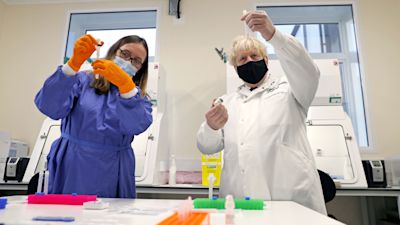Covid: UK to stay ‘one step ahead’ of virus with investment in testing labs

A multimillion-pound investment in testing capacity will help the UK stay “one step ahead” of coronavirus and any new variants, senior officials said.
Health Secretary Matt Hancock said testing facilities at Porton Down in Wiltshire are to be bolstered to help “future proof” the country, with a cash boost confirmed for the expansion of the laboratories where scientists test existing and new vaccines against variants of concern.
Tests on blood samples can help scientists monitor the effectiveness of the coronavirus vaccines.
Current testing capacity is 700 tests a week, but the Department of Health and Social Care (DHSC) said this will increase to 1,500 by January 2022 – backed with a previous £20 million investment.
The DHSC said a further £29.3 million investment will double the capacity for testing variant samples to 3,000 per week when the work is completed.
Mr Hancock said: “We’ve backed UK science from the very start of this pandemic and this multi-million pound funding for a state-of-the-art vaccine testing facility at Porton Down will enable us to further future-proof the country from the threat of new variants.”
Dr Jenny Harries, chief executive at the UK Health Security Agency (UKHSA), said: “A new variant that can escape the current vaccines is the greatest risk of a third wave.
“This new investment will help us stay one step ahead of the virus by doubling our capacity to test vaccine effectiveness against emerging variants.”
Listen to the ITV News coronavirus podcast
Vaccines minister Nadhim Zahawi said the multi-million pound investment in testing facilities at Porton Down would “future-proof” the UK against new variants of Covid-19.
Speaking to Sky News, he said: “We need to make sure we have vaccine variants that are ready for any virus variant that may escape.”
He said the new investment will deliver in January next year, adding the current vaccination programme was “working effectively against the dominant virus in the UK”.
The investment comes ahead of the expected lifting of the ban on foreign holidays for people in England from May 17 as part of the next easing of coronavirus restrictions.
A risk-based traffic light system will be introduced, with different rules for returning travellers depending on which list their destination is on.
People arriving from a green location will not have to quarantine, while those returning from somewhere on the amber list must self-isolate for at least five days.
The red list requires a 10-night stay in a quarantine hotel at a cost of £1,750 for solo travellers.
The green list for foreign holiday destinations will reportedly be published on Friday, and Government travel advice gives an indication of which destinations could be on it.
What countries could be on the UK's green travel list? When will the travel list be announced?
Daily tests could replace quarantine for those exposed to virus
Tourists visiting a number of popular summer hotspots do not face a level of risk for coronavirus that is “unacceptably high”, according to the latest updates from the Foreign, Commonwealth and Development Office (FCDO).
The FCDO is not advising against non-essential travel to Portugal (excluding the Azores), Spain’s Canary Islands or the Greek islands of Rhodes, Kos, Zante, Corfu and Crete.
Downing Street has admitted the NHS app may not be ready for use as a vaccine passport when international travel resumes.
Holidaymakers visiting most popular foreign destinations will be required to show evidence that they have been vaccinated, received a recent negative test or have coronavirus antibodies.
Transport Secretary Grant Shapps has previously said the NHS app – which is currently used to book medical appointments and order repeat prescriptions – will be able to display evidence that someone in England has been vaccinated or tested.
But the Prime Minister’s official spokesman indicated that officials are working on alternative plans for when international travel resumes.
“Mr Shapps set out the approach we are looking to take,” the spokesman said.
“Obviously we will be able to confirm ahead of the 17th at the earliest what measures are used for those initial countries that are available for travel, be it the app or another approach.”
The spokesman added: “There are other routes to achieving the same end-goal. We are working on the app at the moment, at pace, to have it ready, and we will be able to confirm ahead of the 17th at the earliest what approaches we will be using.”